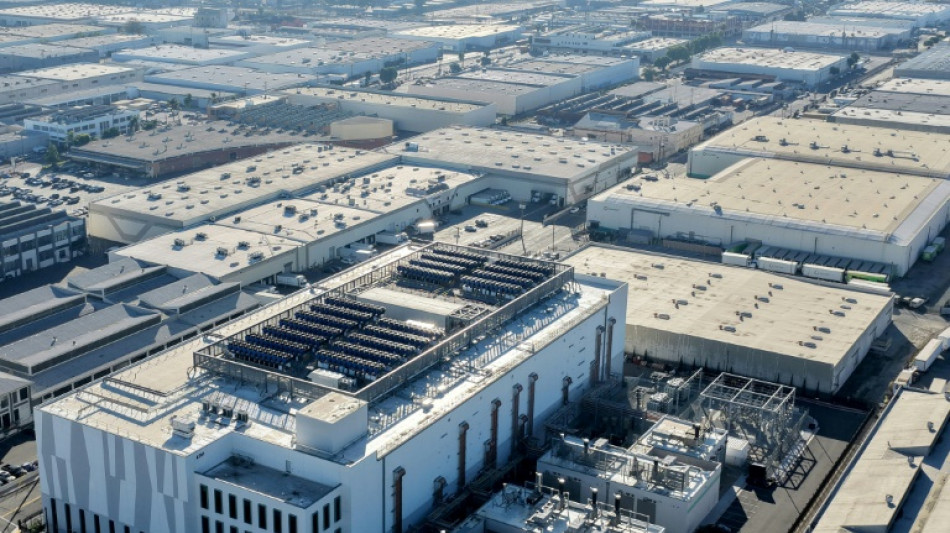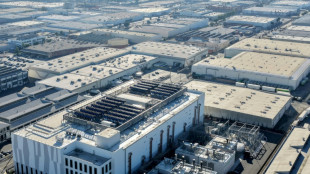
-
 Man City win as Inter stay perfect, Barca held in Champions League
Man City win as Inter stay perfect, Barca held in Champions League
-
French superstar DJ Snake wants new album to 'build bridges'

-
 Barca rescue draw at Club Brugge in six-goal thriller
Barca rescue draw at Club Brugge in six-goal thriller
-
Foden hits top form as Man City thrash Dortmund

-
 NBA officials brief Congress committee over gambling probe
NBA officials brief Congress committee over gambling probe
-
Inter beat Kairat Almaty to maintain Champions League perfection

-
 Newcastle sink Bilbao to extend Champions League winning run
Newcastle sink Bilbao to extend Champions League winning run
-
Wall Street stocks rebound after positive jobs data

-
 LPGA, European tour partner with Saudis for new Vegas event
LPGA, European tour partner with Saudis for new Vegas event
-
Eyes turn to space to feed power-hungry data centers

-
 Jazz lose Kessler for season with shoulder injury
Jazz lose Kessler for season with shoulder injury
-
League scoring leader Messi among MLS Best XI squad

-
 MLS bans Suarez for Miami's winner-take-all playoff match
MLS bans Suarez for Miami's winner-take-all playoff match
-
McIlroy appreciates PGA of America apology for Ryder Cup abuse

-
 Garnacho equaliser saves Chelsea in Qarabag draw
Garnacho equaliser saves Chelsea in Qarabag draw
-
Promotions lift McDonald's sales in tricky consumer market

-
 Five things to know about New York's new mayor
Five things to know about New York's new mayor
-
Anisimova beats Swiatek to reach WTA Finals last four

-
 US Supreme Court appears skeptical of Trump tariff legality
US Supreme Court appears skeptical of Trump tariff legality
-
AC Milan post third straight annual profit on day of San Siro purchase

-
 Angelina Jolie visits Ukrainian frontline city, media reports say
Angelina Jolie visits Ukrainian frontline city, media reports say
-
UN says forests should form key plank of COP30

-
 Star designer Rousteing quits fashion group Balmain
Star designer Rousteing quits fashion group Balmain
-
Mexico's Sheinbaum steps up cartel fight after murder of anti-narco mayor

-
 Attack on funeral in Sudan's Kordofan region kills 40: UN
Attack on funeral in Sudan's Kordofan region kills 40: UN
-
Key PSG trio set for spell on sidelines

-
 Democrats punch back in US elections - and see hope for 2026
Democrats punch back in US elections - and see hope for 2026
-
BMW reports rising profitability, shares jump

-
 US Supreme Court debates legality of Trump's tariffs
US Supreme Court debates legality of Trump's tariffs
-
Bolivia Supreme Court orders release of jailed ex-president Jeanine Anez

-
 Wall Street stocks rise after positive jobs data
Wall Street stocks rise after positive jobs data
-
'Hostage diplomacy': longstanding Iran tactic presenting dilemma for West

-
 Rybakina stays perfect at WTA Finals with win over alternate Alexandrova
Rybakina stays perfect at WTA Finals with win over alternate Alexandrova
-
Le Garrec welcomes Dupont help in training for Springboks showdown

-
 Brussels wants high-speed rail linking EU capitals by 2040
Brussels wants high-speed rail linking EU capitals by 2040
-
Swiss business chiefs met Trump on tariffs: Bern

-
 At least 9 dead after cargo plane crashes near Louisville airport
At least 9 dead after cargo plane crashes near Louisville airport
-
France moves to suspend Shein website as first store opens in Paris

-
 Spain's exiled king recounts history, scandals in wistful memoir
Spain's exiled king recounts history, scandals in wistful memoir
-
Wall Street stocks steady after positive jobs data

-
 Trump blasts Democrats as government shutdown becomes longest ever
Trump blasts Democrats as government shutdown becomes longest ever
-
Indian pilgrims find 'warm welcome' in Pakistan despite tensions

-
 Inter and AC Milan complete purchase of San Siro
Inter and AC Milan complete purchase of San Siro
-
Swedish authorities inspect worksite conditions at steel startup Stegra

-
 Keys withdraws from WTA Finals with illness
Keys withdraws from WTA Finals with illness
-
Prince Harry says proud to be British despite new life in US

-
 BMW boosts profitability, welcomes Nexperia signals
BMW boosts profitability, welcomes Nexperia signals
-
EU strikes last-ditch deal on climate targets as COP30 looms

-
 Stocks retreat as tech bubble fears grow
Stocks retreat as tech bubble fears grow
-
Shein opens first permanent store amid heavy police presence


Eyes turn to space to feed power-hungry data centers
Tech firms are floating the idea of building data centers in space and tapping into the sun's energy to meet out-of-this-world power demands in a fierce artificial intelligence race.
US startup Starcloud this week sent a refrigerator-sized satellite containing an Nvidia graphics processing unit (GPU) into orbit in what the AI chip maker touted as a "cosmic debut" for the mini-data center.
"The idea is that it will soon make much more sense to build data centers in space than it does to build them on Earth," Starcloud chief executive Philip Johnston said at a recent tech conference in Riyadh.
Along with a constant supply of solar energy, data centers are easier to cool in space, advocates note.
Announcements have come thick and fast, the latest being Google this week unveiling plans to launch test satellites by early 2027 as part of its Suncatcher project.
That news came just days after tech billionaire Elon Musk claimed his SpaceX startup should be capable of deploying data centers in orbit next year thanks to its Starlink satellite program.
Starcloud's satellite was taken into space by a SpaceX rocket on Sunday.
- Junk and radiation -
Current projects to put data centers into orbit envision relying on clusters of low Earth orbit satellites positioned close enough together to ensure reliable wireless connectivity.
Lasers will connect space computers to terrestrial systems.
"From a proof concept, it's already there," University of Arizona engineering professor Krishna Muralidharan, who is involved with such work, said of the technology.
Muralidharan believes space data centers could be commercially viable in about a decade.
Amazon founder Jeff Bezos, the tech titan behind private space exploration company Blue Origin, has estimated it might take up to twice that long.
Critical technical aspects of such operations need to be resolved, particularly harm done to GPUs by high levels of radiation and extreme temperatures as well as the danger of being hit by space junk.
"Engineering work will be necessary," said University of Michigan assistant professor of engineering Christopher Limbach, contending that it is a matter of cost rather than technical feasibility.
- Sun synched -
The big draw of space for data centers is power supply, with the option of synchronizing satellites to the sun's orbit to ensure constant light on solar panels.
Tech titans building AI data centers have ever-growing need for electricity, and have even taken to investing in nuclear power plants.
Data centers in space also avoid the challenges of acquiring land and meeting local regulations or community resistance to projects.
And advocates argue that data centers operating in space are less harmful overall to the environment, aside from the pollution generated by rocket launches.
Water needed to cool a space data center would be about the same amount used by a space station, relying on exhaust radiators and re-using a relatively small amount of liquid.
"The real question is whether the idea is economically viable," said Limbach.
An obstacle to deploying servers in space has been the cost of getting them into orbit.
But a reusable SpaceX mega-rocket called Starship with massive payload potential promises to slash launch expenses by at least 30 times.
"Historically, high launch costs have been a primary barrier to large-scale space-based systems," Suncatcher project head Travis Beals said in a post.
But project launch pricing data suggests prices may fall by the mid-2030s to the point at which "operating a space-based data center could become comparable" to having it on Earth, Beals added.
"If there ever was a time to chart new economic paths in space -- or re-invent old ones -- it is now," Limbach said.
O.Salim--SF-PST

